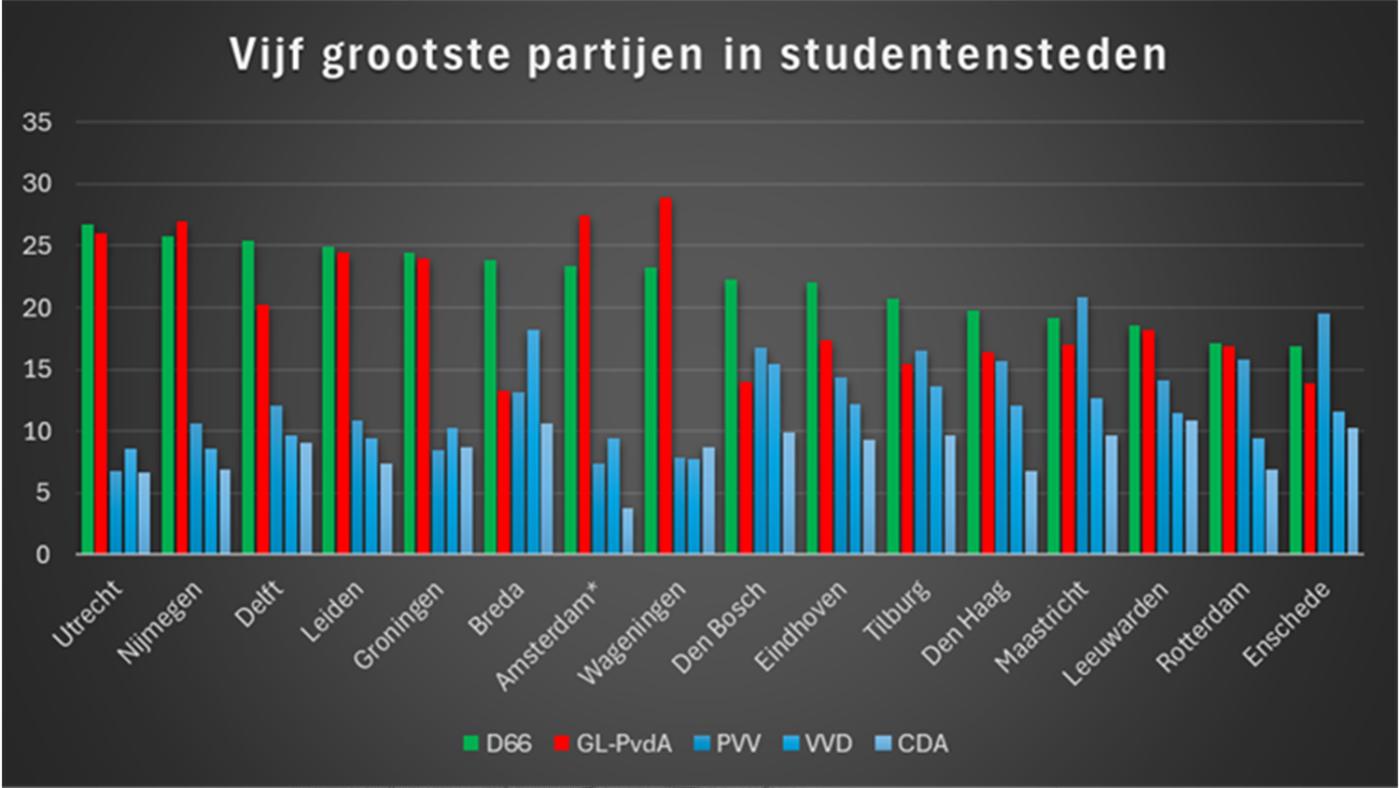Dutch elections
D66 is the largest party in university cities, by a small margin

No other political party has gained as many seats in the Dutch parliamentary elections as D66, and university cities helped carry the party to this victory. Over 25 percent of voters in the cities of Utrecht, Nijmegen and Delft voted for D66. On average, D66 won 22 per cent of the votes in sixteen cities with universities and/or universities of applied sciences, compared to 16 per cent nationally.
The left-wing party GroenLinks-PvdA (an alliance between the Green Left and the Labour Party) also did relatively well in those cities, with 20 per cent of the vote. This party was the largest in Amsterdam, Wageningen and Nijmegen. In Leiden, Rotterdam, Leeuwarden, Utrecht and Groningen, the difference compared to D66 was less than one per cent.
The far-right party PVV, which obtained as many seats as D66, but lost a lot of seats compared to the previous elections, follows at a distance with an average of 13 percent of the votes in these cities. It has managed to be the largest in the cities of Maastricht and Enschede, however.
Over 99 percent of the votes have been counted by now.
“Great opportunities”
D66 is in favour of increasing education spending. Even so, the National Student Union is not celebrating the party's win of 17 seats. “We will be keeping an eye on you,” says the chair of the organisation, Maaike Krom, to politicians in The Hague. By this, she means she will wait to see whether the basic student grant will increase, for example.
Sarah Evers, from the National Student Association (ISO), sounds slightly more positive. She sees "great opportunities" for students with D66 in the government. The party is also in favour of a mandatory internship allowance and the reversal of the austerity measures imposed by the previous cabinet.
BBB, SGP and Volt
The preliminary results also show that right-wing parties such as BBB (Farmer Citizen Movement) and SGP (the Reformed Political Party) receive little support in student cities. BBB leader Caroline van der Plas does not exceed 1 per cent, while she achieves 2.7 per cent nationally. The difference is even greater for SGP leader Chris Stoffer, with 0.3 per cent compared to 2.3 per cent.
For the European-leaning party Volt, the results in student cities have been disappointing this time around. Its leader, Laurens Dassen, received an average of 1.9 per cent of the vote, which is 0.8 percentage points higher than in the rest of the country. The party now only has one seat.
What now?
Not all votes have been counted yet. Some of the votes from Amsterdam will not be counted until today, and postal votes have not yet been included. Next Friday, the Electoral Council will announce the official results, and the party leaders will discuss them.
According to the latest national count, PVV has two thousand more votes than D66. This means that PVV leader Geert Wilders would be the first in line to form a coalition. However, the chance that he will be able to govern is small, as many parties have ruled out cooperating with him.
Comments
We appreciate relevant and respectful responses. Responding to DUB can be done by logging into the site. You can do so by creating a DUB account or by using your Solis ID. Comments that do not comply with our game rules will be deleted. Please read our response policy before responding.